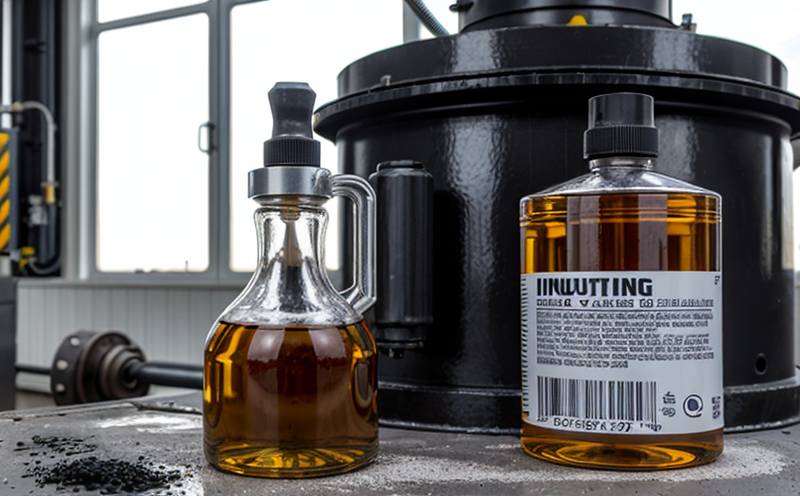GB T 12579 Additive Testing in Fertilizer Oils
The GB/T 12579 standard is a crucial document for the chemical testing of industrial oils and additives, specifically designed to ensure the quality, safety, and performance of these products. This method is widely used in the fertilizer industry to evaluate the effectiveness and stability of additive formulations. In this service, we focus on the rigorous testing procedures outlined in GB T 12579, which are essential for ensuring that industrial oils meet stringent specifications.
The standard specifies detailed methodologies for determining various properties of industrial oils used as additives in fertilizers. These include viscosity, flash point, pour point, and oxidative stability. The test parameters are critical because they directly influence the performance of the additive in the fertilizer formulation, affecting its shelf life, compatibility with other ingredients, and overall efficacy.
For instance, viscosity is a key characteristic that determines how easily an oil-based additive can be mixed into the fertilizer blend. A higher viscosity may indicate better adhesion properties but could also pose challenges during application. The flash point provides information on the ignition risk of the additive when it comes into contact with other components or environmental factors.
The pour point is particularly important for ensuring that the oil remains liquid under cold conditions, which is crucial in various climatic zones where fertilizers are used. Oxidative stability ensures that the additive does not degrade prematurely, maintaining its integrity and effectiveness over time.
During testing, it's essential to follow strict procedures to ensure accurate results. Specimen preparation involves precise sampling techniques to avoid contamination or degradation of the oil sample before testing. The chosen apparatus must be calibrated according to international standards to provide reliable data. Reporting the findings accurately is equally important; detailed reports should include all relevant test parameters and their interpretations.
The GB/T 12579 standard also emphasizes the importance of understanding the chemical composition of industrial oils, as this knowledge can influence how additives interact with other components in fertilizers. By adhering to these standards, laboratories ensure that they are providing accurate and consistent results, which is vital for maintaining quality control throughout the production process.
In summary, GB T 12579 additive testing plays a pivotal role in ensuring that industrial oils used as additives in fertilizers meet the required specifications. This service not only enhances product performance but also supports regulatory compliance and safety standards, making it an indispensable tool for quality managers, compliance officers, R&D engineers, and procurement specialists.
Why It Matters
The importance of GB T 12579 additive testing in fertilizer oils cannot be overstated. This method ensures that industrial oils used as additives are of the highest quality, which is critical for several reasons:
- Enhanced Performance: Properly tested oil additives can significantly improve the overall performance of fertilizers, leading to better crop yields and healthier plant growth.
- Safety and Reliability: Ensuring that the oils are stable under various conditions minimizes the risk of accidents or failures during application.
- Regulatory Compliance: Adhering to international standards like GB T 12579 helps laboratories meet regulatory requirements, thereby protecting both consumers and the environment.
By implementing rigorous testing protocols, we can provide customers with confidence that their products are safe, effective, and compliant. This is particularly important in industries where quality control is paramount, such as agriculture and chemical manufacturing.
Industry Applications
| Application | Description |
|---|---|
| Fertilizer Production | GB T 12579 testing ensures that the industrial oils used as additives meet the necessary quality standards, enhancing the performance of fertilizers. |
| R&D and Innovation | The standard supports research into new additive formulations by providing consistent and reliable test results. |
| Quality Control | GB T 12579 testing is integral to maintaining high standards of quality throughout the production process, from raw material selection to final product release. |
The application of GB T 12579 in fertilizer oil testing extends beyond just compliance; it also plays a role in driving innovation and ensuring reliability. By adhering to this standard, laboratories can contribute significantly to the development of safer and more effective fertilizers, ultimately benefiting agricultural productivity and environmental health.
Competitive Advantage and Market Impact
- Innovation Leadership: By staying ahead in terms of testing methodologies and adherence to international standards like GB T 12579, laboratories can position themselves as leaders in their field.
- Customer Satisfaction: Providing accurate and reliable test results builds trust with customers, leading to higher satisfaction levels and repeat business.
- Market Differentiation: Laboratories that offer comprehensive testing services aligned with international standards can differentiate themselves from competitors, gaining a competitive edge in the market.
The competitive advantage derived from GB T 12579 additive testing is not just about meeting regulatory requirements; it's also about ensuring that products perform optimally under various conditions. This approach helps laboratories remain at the forefront of technological advancements and industry best practices, contributing to their long-term success in a highly competitive market.





